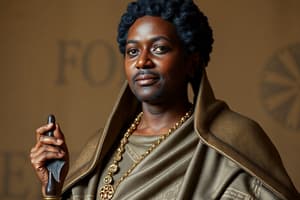Podcast
Questions and Answers
What type of art was notably influenced by the Byzantine style in Nubia?
What type of art was notably influenced by the Byzantine style in Nubia?
- Wood carvings depicting animals
- Mosaics displaying nature scenes
- Statues of Nubian deities
- Murals illustrating the Virgin and saints (correct)
Which term was used to refer to the royal governor in Nobatia?
Which term was used to refer to the royal governor in Nobatia?
- Domestikos
- Bishop
- Eparch (correct)
- Protodomestikos
What language did the upper classes of Nubia predominantly use?
What language did the upper classes of Nubia predominantly use?
- Arabic
- Latin
- Hebrew
- Greek (correct)
Which city likely had a significant influence on the Nubian church by the eighth century?
Which city likely had a significant influence on the Nubian church by the eighth century?
How many episcopal sees is it suggested Nubia had at one point?
How many episcopal sees is it suggested Nubia had at one point?
What was one function of Nubia's military forces in the context of the church?
What was one function of Nubia's military forces in the context of the church?
What aspect of Nubian documents remains largely unexplored?
What aspect of Nubian documents remains largely unexplored?
What may have characterized the liturgy used by the Nubian church?
What may have characterized the liturgy used by the Nubian church?
What role did Africa play in the self-understanding of American blacks throughout the nineteenth century?
What role did Africa play in the self-understanding of American blacks throughout the nineteenth century?
Which early church father is associated with the interpretation of the Song of Songs in relation to African heritage?
Which early church father is associated with the interpretation of the Song of Songs in relation to African heritage?
How did Origen interpret the queen of Sheba in his commentary on the Song of Songs?
How did Origen interpret the queen of Sheba in his commentary on the Song of Songs?
What was the significance of the scrolls attached to the remains found at Q'asr Ibrim?
What was the significance of the scrolls attached to the remains found at Q'asr Ibrim?
In the interpretation of the Song of Songs, what did Origen assert about the church's relationship to the queen of Sheba?
In the interpretation of the Song of Songs, what did Origen assert about the church's relationship to the queen of Sheba?
What ancient version of the Scriptures does Origen reference regarding the queen of Sheba's identity?
What ancient version of the Scriptures does Origen reference regarding the queen of Sheba's identity?
Who ordained Bishop Timotheos according to the scrolls found with his remains?
Who ordained Bishop Timotheos according to the scrolls found with his remains?
Which dialect was one of the scrolls found with Bishop Timotheos written in?
Which dialect was one of the scrolls found with Bishop Timotheos written in?
Which characteristic of the queen of Sheba does Origen use to symbolize the church?
Which characteristic of the queen of Sheba does Origen use to symbolize the church?
According to Origen, what does the term 'black and beautiful' signify about the church?
According to Origen, what does the term 'black and beautiful' signify about the church?
What does the discovery of Timotheos’s remains indicate about Christianity in Nubia?
What does the discovery of Timotheos’s remains indicate about Christianity in Nubia?
How does the depiction of Ethiopia in scriptural references relate to the broader understanding of black identity in America?
How does the depiction of Ethiopia in scriptural references relate to the broader understanding of black identity in America?
When did the episcopacy of Gabriel IV occur?
When did the episcopacy of Gabriel IV occur?
Which African kingdom was converted to Christianity earlier than Nubia?
Which African kingdom was converted to Christianity earlier than Nubia?
What significant development occurred in Axum during the first century A.D.?
What significant development occurred in Axum during the first century A.D.?
What is the written language of Ethiopia known as?
What is the written language of Ethiopia known as?
What significant event did King Caleb lead an expedition against in southern Arabia?
What significant event did King Caleb lead an expedition against in southern Arabia?
Which liturgical tradition influenced the Ethiopian liturgy?
Which liturgical tradition influenced the Ethiopian liturgy?
What unique architectural feature is associated with Ethiopia's Christian heritage?
What unique architectural feature is associated with Ethiopia's Christian heritage?
Which position was historically always held by an Egyptian until 1951 in the Ethiopian church?
Which position was historically always held by an Egyptian until 1951 in the Ethiopian church?
Which theological position do Ethiopians primarily follow as a result of the Council of Chalcedon in 451?
Which theological position do Ethiopians primarily follow as a result of the Council of Chalcedon in 451?
What language was primarily spoken at the Ethiopian court during the influence of Greek culture?
What language was primarily spoken at the Ethiopian court during the influence of Greek culture?
Ethiopia's connection with the Byzantine Empire was significantly affected by which major historical event?
Ethiopia's connection with the Byzantine Empire was significantly affected by which major historical event?
Which historical figure is linked to the early development of the Catholic Church in Ethiopia?
Which historical figure is linked to the early development of the Catholic Church in Ethiopia?
Who sent the first missionaries to Nubia in the middle of the sixth century?
Who sent the first missionaries to Nubia in the middle of the sixth century?
What doctrine did Monophysites believe regarding the nature of Christ?
What doctrine did Monophysites believe regarding the nature of Christ?
Which kingdom in Nubia adhered to the Chalcedonian doctrine?
Which kingdom in Nubia adhered to the Chalcedonian doctrine?
By what century had Nubia officially become Christian?
By what century had Nubia officially become Christian?
What was the primary reason for the divided Christian faith when it arrived in Nubia?
What was the primary reason for the divided Christian faith when it arrived in Nubia?
When did serious study of Christian Nubia begin?
When did serious study of Christian Nubia begin?
What was one significant event that stimulated the study of Christian Nubia?
What was one significant event that stimulated the study of Christian Nubia?
What significant aspect of Nubia's kingdoms does the text mention?
What significant aspect of Nubia's kingdoms does the text mention?
Study Notes
African Roots in the Catholic Church
- Black history begins in Africa, and throughout the nineteenth century, African roots became central to the identity of American blacks, including Catholics.
- The black Catholic community traced its roots to the religious experiences of Africa and found significance in the African saints of the early Church.
- Both Protestant and Catholic American blacks found their roots in the black Africans who appeared in the pages of the Bible, particularly in references to Ethiopia in the Psalms and Prophets.
- Origen, a third-century church father, interpreted the Song of Songs as a love poem between Solomon and the Queen of Sheba, whom he saw as an Ethiopian queen representing the church.
Early Nubian Christianity
- Justinian, the Byzantine emperor, sent missionaries to Nubia in the sixth century, alongside his wife, Theodora.
- Theodora supported the Monophysite doctrine, which viewed Christ as having only one divine nature, while Justinian favored the Chalcedonian doctrine of two natures, human and divine.
- Nubia by the sixth century was divided into three kingdoms, with Nobatia in the north, Makouria in the center, and Alwa in the south, each adopting different Christian doctrines.
- By the seventh century, Nobatia and Makouria united under one king, adhering to Monophysitism, although traces of Melkite (Chalcedonian) episcopal influence remained.
- Recent excavations in the last half-century have revealed the rich artistic and cultural heritage of Nubian Christianity.
The Legacy of Nubian Christianity
- Nubian churches featured murals depicting the Virgin and saints, often with white skin, and their kings, queens, and nobles, with dark skin, reflecting the influence of Byzantine art and culture.
- Despite being isolated from the rest of the Christian world, Nubia preserved its own liturgy, manuscripts written in Nubian script, and a Byzantine-influenced administrative structure.
- Nubia's Christian identity survived for centuries, evidenced by the discovery of the remains of Bishop Timotheos, ordained in 1372-1380, indicating the church's endurance into the late Middle Ages.
- While the exact time of Christianity's complete demise in Nubia is uncertain, evidence suggests its presence until the eighteenth century.
Ethiopian Christianity
- Ethiopia converted to Christianity two centuries before Nubia, developing its own distinct Christian tradition and culture.
- The civilization, established by Semites from southern Arabia, had its own written language, Ge'ez, and a centralized monarchy based in Axum.
- The Ethiopian church, established in the fifth century, adopted a liturgy derived from the Coptic liturgy of Alexandria, but with unique features in texts, rites, music, and art.
- Despite being part of the patriarchate of Alexandria, Ethiopia maintained its own translation of the Bible, patristic texts, and a strong monastic tradition.
Ethiopia's Place in Christian History
- Ethiopia, like Nubia, rejected the Chalcedonian doctrine and remained Monophysite, with the exception of a small Eastern Rite Ethiopian Church affiliated with Rome.
- Despite its geographical isolation, the Ethiopian church represents a key example of an early African Christian church, predating the spread of Christianity in northern Europe.
- Ethiopia's Christian history, rooted in the early church, showcases a vibrant African Christian culture that significantly contributed to the broader Christian heritage.
Studying That Suits You
Use AI to generate personalized quizzes and flashcards to suit your learning preferences.
Related Documents
Description
Explore the connections between African heritage and the Catholic Church, focusing on the significance of African saints and biblical references. Delve into early Nubian Christianity and the influence of Byzantine missionaries in shaping religious identity. This quiz will enhance your understanding of the black Catholic experience and its historical roots.




